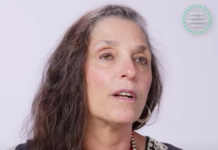What It’s Like to Be Involuntarily Committed
Ten years after being fired for taking a mental health leave after the Virginia Tech massacre, I was diagnosed as "schizophrenic" and involuntarily committed to a hospital. Now I have a job and a life, but I'm still forced to take drugs and report to a social worker.
Nuanced History of Asylums Shows Context Matters
A bottom-up approach to understanding the history of asylums allows us to learn from past successes and failures in the mental health system.
To Live and (Almost) Die in L.A.: A Survivor’s Tale
After 25 years of chronic emergency, 22 mental hospitalizations, a stint at a “community mental health center,” 13 years in a "board & care," repeated withdrawals from addictions to legal drugs, and a 12-year marriage, I plan to live every last breath out as a survivor, an advocate, and an artist.
The Media’s New Hashtag: #GuardianshipIsGood for Britney Spears
Recent press coverage of top star Britney Spears, who remains under a personal and professional guardianship, reflects conventional attitudes about “mental illness” that are both stigmatizing and encourage legislation that promotes forced treatment.
Measuring How Mental Health Professionals See Service Users’ Rights
A new scale has been developed and validated to examine beliefs held by mental health professionals towards service users’ rights.
Involuntary Hospitalization More Likely With Psychosis Diagnoses and Few Resources
New study links involuntary hospitalization with psychotic diagnosis, previous involuntary hospitalization, and economic deprivation.
Reflections on a Decade of Assertive Community Treatment
Sometimes I am crazy and sometimes I need help, but that help must not be forced upon me. I need to direct my own care; I need to be listened to. ACT is a method of social control that has more to do with saving money than assisting those in need. Money is saved by turning patients' homes into hospitals.
Dehumanization Linked to Poorer Mental and Physical Health
A new review finds that dehumanizing language, including self-dehumanization, is connected to anxiety, depression, and disordered eating.
Refugees and Immigrants Experience Increased Medical Coercion
Refugees and first-generation immigrants of African descent are at greater risk of experiencing medical coercion when compared to immigrants of other visible minority communities in Canada.
Berlin Manifesto for Humane Psychiatry Released
Changing the mental health and psychosocial support system in Germany requires public debate about the ways our society should help and support people in mental crisis and with chronic mental health problems. We believe the driving force behind all help and support should be humanitarianism and respect for inalienable human rights.
UN Expert Calls for Major Shift in Suicide Prevention Efforts on World Mental Health...
On World Mental Health Day, UN expert Dainius Pūras calls for a shift away from medical solutions toward a rights-based approach to make life “more liveable.” He calls for states to address societal determinants of mental health, promoting autonomy and resilience.
Humanizing Mental Healthcare by Reducing Coercive Practices
A review of the literature demonstrates that coercive practices lack empirical support and violate human rights.
Forced-Treatment Advocacy Group Cherry-Picks Data to Support Agenda (Again)
Did the Treatment Advocacy Center actually uncover research proving that poor psychiatric medication adherence plays a "significant" role in whether people diagnosed with schizophrenia become violent? If such research does exist, is it as compelling as TAC described?
Equal Legal Capacity or ‘Supported Decision-Making’?
At a recent conference on legal capacity, I was struck by the failure of another invited expert to adhere to the paradigm of supported decision-making as articulated by the CRPD Committee. We still need to work to ensure that this paradigm is well understood and appreciated, despite the progress made in national reforms.
Forced Drugging with Antipsychotics is Against the Law: Decision in Norway
In all countries, we need to work for ensuring that forced medication for psychiatric patients is forbidden by law. Virtually all countries, apart from the US, have ratified the UN Convention on the Rights of Persons with Disabilities, which prohibits forced drugging, but not a single country has done anything.
United Nations Rep Brings Attention to Human Rights Violations in Psychiatry
Dr. Dainius Pūras argues that the status quo in mental health treatment is no longer acceptable and demands political action to promote human rights.
When the Hospital is Sick
At my job as an inpatient mental health counselor, I had to confront the reality of a hospitalization system with serious and devastating flaws. I felt immensely powerless and understood how my coworkers could end up so negligent, numb, and at times abusive. And I understood how patients could become violent or self-injurious after years in these dismal hospitals.
MIA Survey: Ex-patients Tell of Force, Trauma and Sexual Abuse in America’s Mental Hospitals
In a MIA survey of people who had been patients in mental hospitals, nearly 500 respondents told of an experience that was often traumatic, and frequently characterized by a violation of their legal rights, forced treatment with drugs, and physical or sexual abuse. Only 17% said they were “satisfied” with the “quality of the psychiatric treatment” they received.
Sociologist Questions Effectiveness and Ethics of Mental Health Services
Medical sociologist David Pilgrim argues that mental health care is neither effective nor “kindly,” as it often relies on flawed research and ineffective treatments.
Escaping from AOT: Letter to the Judge
To the judge presiding over my upcoming AOT hearing: I would like a better way to take care of my own health care than the choices currently being imposed on me by community mental health centers, which involve forcibly injecting me with a drug that I do not want and making me take a daily pill that I do not want to take. There is no reason that anyone should make my own health care choices for me.
Former Service User Studies the Inpatient Experience
Researcher and former service-user Diana Rose utilizes a participatory research process to examine experiences on inpatient wards.
Inhumane Medicine in Germany: A Dark Chapter Continued
Although I left Ueckermünde without the ability to speak, heavily traumatized and barely able to move, I managed to reclaim life after more than a decade. Today I am one of the few witnesses who survived the Hell of Ueckermünde, who can tell the story of my companions and raise awareness of the injustice committed against us as well as demand answers.
FDA Defends Decision to Approve Digital Aripiprazole
Members of the U.S. Food and Drug Administration’s Psychiatry Products division go on the defensive in a new article, responding to concerns about the agency’s approval of digital aripiprazole.
Spotlight on Institutional Psychiatry
Spotlight on Institutional Psychiatry is a response by psychiatric survivors and allies to Operating in Darkness, a scathing 2017 report on British Columbia’s Mental Health Act Detention System. We hope that professionals will take note of the devastating effects of forced psychiatric treatment and be moved to speak out, and, above all, that survivors will feel encouraged and inspired by our efforts.
Mental Health Industry Should Embrace Choices Beyond Drugs
In this video for NowThis, Yana Jacobs critiques the mental health industry standard of prescribing drugs as the first-line treatment for "mental illness." She emphasizes...
































